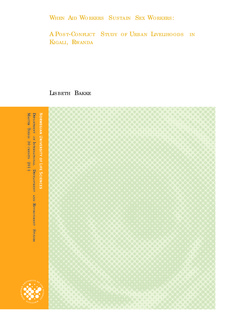| dc.contributor.author | Bakke, Lisbeth | |
| dc.date.accessioned | 2012-05-18T12:36:48Z | |
| dc.date.available | 2012-05-18T12:36:48Z | |
| dc.date.issued | 2012-05-18 | |
| dc.identifier.uri | http://hdl.handle.net/11250/187866 | |
| dc.description.abstract | As billions of aid dollars has been flourishing from the North to the South the past six decades, many developing countries are still poor and destitute. This thesis argue that by giving cash to the poor, they will know how to promote development in a much more sustainable manner than when international NGOs are in charge of complex development aid projects. The study is set in Kigali, Rwanda where local sex workers are common within the international aid community. Based on qualitative interviews the object of this study is to explore the impact large sums of dollars for sex trade is affecting development within urban poor households. The city of Kigali is home for a vast number of international development aid projects and agencies working to fulfill the Millennium Development Goals. Still the rapidly growing urban settlement is far from reaching these goals despite the intensive development aid efforts. The findings of this thesis conclude that when the poor are receiving cash, they will not waste it but rather promote development for themselves on a far greater extent than traditional aid agencies until now have accomplished. | no_NO |
| dc.description.sponsorship | Development aid apparatus | no_NO |
| dc.language.iso | eng | no_NO |
| dc.publisher | Norwegian University of Life Sciences, Ås | |
| dc.subject | development aid | no_NO |
| dc.subject | sex | no_NO |
| dc.subject | trade | no_NO |
| dc.subject | Kigali | no_NO |
| dc.subject | Rwanda | no_NO |
| dc.title | When aid workers sustain sex workers : a post-conflict study of urban livelihoods in Kigali, Rwanda | no_NO |
| dc.type | Master thesis | no_NO |
| dc.subject.nsi | VDP::Social science: 200 | no_NO |
| dc.source.pagenumber | 71 | no_NO |

